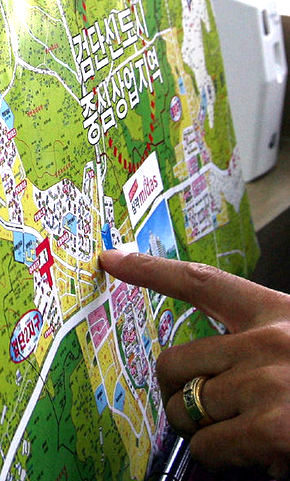 |
|
A potential buyer of an apartment points with his finger at the construction site on the map.
|
Opinions vary, but experts agree it would be a 'very bad' situation for S.K. economy
A rapid rise in housing prices has prompted warnings that South Korea faces a bubble on the brink of bursting. Some experts say this may bring effects not felt since the 1997-98 Asian financial crisis. The National Tax Service announced a plan on November 15 to look into the earnings of those that have reaped considerable gains via recent real estate transactions. Announcing the plan, the tax regulator called prices in Seoul's Gangnam district "abnormally and irrationally higher" than those of other districts. Citing internal analysis, the governmental regulatory body said the highest-selling price of an apartment in Gangnam is two times higher than the price of a similar apartment in Tokyo and 1.3 times higher than its price in New York. Meanwhile, The KS Economic Research Institute, which has influenced the current administration's fiscal policy, said, "Property prices over the past few years definitely represent part of a bubble," but did not provide specific figures. The center warned that the real estate market is on the brink of a burst-bubble effect. However, the center expected the bubble would continue to swell for now, noting that it was affected by such factors as next year's presidential election. If the bubble burst, the center warned, South Korea could face a crisis similar to its 1997-98 crisis, which required a US$58 billion bailout of South Korea by the International Monetary Fund (IMF).Daishin Economic Research Institute chief Kim Young-ick also acknowledged the presence of a bubble in property prices, but the possibility for South Korea to face a bubble burst like Japan faced in 1991 is low, he said. Sin Seong-ho at Dongbu Securities expected house prices to rise steadily over the next two or three years. All of the experts urged people to anticipate the risk of a possible bubble burst. If the bubble burst, victims will be the ordinary people who purchased their homes through mortgage loans, not real-estate speculators, they said. The Samsung Economic Research Institute earlier announced that as of the first half of last year, 32.4 percent of apartment prices nationwide represented an economic bubble. In addition, 17 percent of all property prices, including apartments, amounted to a “bubble” status, according to the institute. Given the current pace of property price increase, the bubble is only expected to swell in size, the institute said. Others downplayed the risk of a bubble in the Korean real estate market. Jerald Schiff, assistant director of the IMF's Asia-Pacific department, recently said there is no "bubble" effect seen in current Korean home prices [and that the recent price surge is purely market-driven.] Finance and Economy Minister Kwon O-kyu said on November 13 that it is difficult to determine whether the overall property market is going through a bubble phase, but he did not deny its presence in Gangnam and Seoul metropolitan areas. The differences seen between perceived presence and size of a real estate bubble can be attributed to the difference in methodology employed by each research body. For example, the National Tax Service compared home prices with per-capital gross domestic product (GDP), while the Samsung Economic Research Institute compared the prices with the country's annual economic growth rate, tabulated by looking at the difference between the balanced interest rate and the real interest rate, or that adjusted for inflation, among other factors. The KS Economic Research Institute compared home prices with the average income of workers. One thing is agreed upon by all of the research: if a bubble were to burst, the economy would be significantly damaged. But no clear outlook is being presented.






